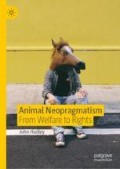Abstract
In this chapter I outline a key element of animal neopragmatism: relational hedonism. Relational hedonism is a psychological-cum-anthropological thesis about public concern for pain. The central claim is that to show concern for the pain of an individual is to betray concern for them in a much broader sense. The basic idea is that concern for pain is concern for more than pain. This concern can be variously expressed as concern for life, well-being, intrinsic value, inherent value, or simply concern for the individual for their own sake. The theory of relational hedonism draws upon Helm’s theory of love and friendship. In line with Helm’s view, to show concern for a particular aspect of a person’s life is to show concern for them in a holistic sense. I adapt Helm’s theory to explain the broad-based conception of welfare that the attitudes-to-animals data suggests is the folk’s conception of welfare.
Access this chapter
Tax calculation will be finalised at checkout
Purchases are for personal use only
References
Carruthers, Peter. 2005. Consciousness: Essays from a higher-order perspective. Oxford: Oxford University Press.
Cooke, Steve. 2017. Imagined utopias: Animal rights and the moral imagination. Journal of Political Philosophy 25 (4): 1–18.
Dorsey, Dale. 2015. The significance of life’s shape. Ethics 125 (2): 303–330.
Gaita, Raimond. 2002. The philosopher’s dog. Melbourne: Text Publishing.
Hadley, John. 2013. Liberty and valuing sentient life. Ethics and the Environment 18 (1): 87–114.
Harrison, Ruth. 1964. Animal machines: The new factory farming industry. London: Vincent Stuart.
Helm, Bennett W. 2010. Love, friendship and the self. Oxford: Oxford University Press.
Hutto, Daniel. 2007. Narrative and understanding persons. Royal Institute of Philosophy Supplements 60 (May): 1–16.
Kahane, Guy. 2016. Pain, experience and well-being. In The Routledge handbook of the philosophy of well-being, ed. Guy Fletcher, 209–220. London: Routledge.
Kauppinen, Antti. 2015. What so great about experience? Res Philosophica 92 (2): 371–388.
Mancilla, Alejandra. 2009. Nonhuman animals in Adam Smith’s moral theory. Between the Species 13 (9). https://digitalcommons.calpoly.edu/bts/vol13/iss9/2/. Accessed 1 March 2019.
Milligan, Tony. 2009. Dependent companions. Journal of Applied Philosophy 26 (4): 402–413.
Parfit, Derek. 1984. Reasons and persons. Oxford: Oxford University Press.
Portmore, Douglas W. 2007. Welfare, achievement and self-sacrifice. Journal of Ethics and Social Philosophy 2 (2): 1–29.
Rosati, Connie. 2013. The story of life. Social Philosophy and Policy 30 (1–2): 21–50.
Rowlands, Mark. 2008. The philosopher and the wolf: Lessons from the wild on love, death and happiness. London: Granta.
Rudy, Kathy. 2011. Loving animals. Minneapolis: University of Minnesota Press.
Swenson, Adam. 2009. Pain’s evils. Utilitas 21 (2): 197–216.
Taylor, Charles. 1989. Sources of the self: The making of modern identity. Cambridge: Cambridge University Press.
Velleman, J. David. 1991. Well-being and time. Pacific Philosophical Quarterly 72 (1): 48–77.
Author information
Authors and Affiliations
Corresponding author
Rights and permissions
Copyright information
© 2019 The Author(s)
About this chapter
Cite this chapter
Hadley, J. (2019). Relational Hedonism. In: Animal Neopragmatism. Palgrave Macmillan, Cham. https://doi.org/10.1007/978-3-030-25980-8_4
Download citation
DOI: https://doi.org/10.1007/978-3-030-25980-8_4
Published:
Publisher Name: Palgrave Macmillan, Cham
Print ISBN: 978-3-030-25979-2
Online ISBN: 978-3-030-25980-8
eBook Packages: Religion and PhilosophyPhilosophy and Religion (R0)

